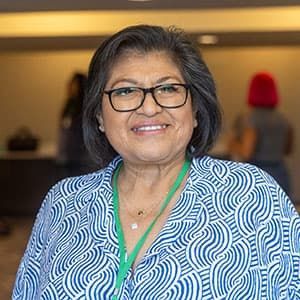
Our environment informs the kind of person we become, whether consciously or subconsciously. For Beatriz Angeles, it was during a mental health training for Santa Barbara County Promotores Network that she realized her calling was a generational inheritance from her mother and grandmother in Peru.
Promotores and community health workers are links between their communities and health and social service providers. They are trusted community members who share the same language, culture, ethnicity and experiences of their communities and act as liaisons to meaningful information and resources for their neighbors and neighborhoods. Beatriz has served as a Promotora for 15 years strengthening her deep-rooted commitment to her community. She grew up watching her mother do laundry, cook and supply food --whatever was needed-- for neighbors. Likewise, she saw her grandmother providing meals for the farm workers every Saturday.
“I saw them give back and take care of people. My mother told me she didn’t work out of necessity, but we work out of love. That is what I have in me and why I love doing what I do.”
Beatriz found her calling during a routine health visit. A diabetic, Beatriz went to the Sansum Diabetes Research Institute looking for nutrition classes. The nutritionist there, a Latina too, saw in her the potential to be a Promotora. Beatriz started going to more workshops and meetings and has been a Promotora ever since. Yet, being a Promotora was volunteer work for most of that time. That changed in 2020 when Beatriz started earning a living doing what she was already passionate about when a local church needed Latino outreach workers to help give out food during the pandemic.
“During the pandemic, they saw us out in the community helping in many ways, not scared of the virus. And that is when more people learned about what we do and saw our value here in Santa Barbara. Now we get paid by agencies to do outreach. Before, it was voluntary. We weren’t even paid for gas.”
Now, she works part-time as a community health worker at the Sansum Diabetes Research Institute. Then, she works the rest of her time as a Promotora at Santa Barbara County Promotores Network, partnering with nonprofits like the Food Bank of Santa Barbara County to serve her community.
At Feeding America’s Elevating Voices: Power Summit this year, Beatriz learned how to use her voice and her story to advocate for her community. “I’ve always helped my community, but now I can go even further and advocate for policies to better serve my community. A Promotora to me is to be able to help people in whatever they need. I want to help people who are going through the same things I did. I myself have needed help in the past. I’ve always advocated for my daughters, even with my half-English. For them, I’m a lion.”
What is a typical day for you?
In the mornings, I’ll start at Sansum at 8:30am until 2pm. Then I’ll go to a food distribution with the food bank. Those typically start at 3:00 or 3:30pm. There, I’ll provide outreach and education around Cal-Fresh, California’s SNAP program. Then, when I get home in the evening, I’m taking computer literacy courses, Monday through Thursday from 5:30pm to 7:30pm. And if it’s a Tuesday or Thursday, I’m also taking English classes in the mornings from 8am to 10am.
How do you know you are making an impact?
When we start doing this work helping at food distributions during the pandemic, we would see the faces of the people we helped, and they would tell us ‘You are saving my life.’ They were families and seniors who would wait for the day of the distribution. They were so grateful. That is when I knew this is why I do this work. I was sure this is my path.
How is food connected to your work as a Promotora?
Food is 80% of my work. We are educating people about how to eat healthier. We tell people “If you want to be well and be healthy, there is no better option than your nutrition – eating healthy food and exercising.
What do you want people to know about your work?
Promotoras do this work out of love for the community. Yes, it is great that we have found ways to get paid for our work, but if that money runs out, we will still do this work. It is our calling.
Learn more about food insecurity in Latino communities or support Beatriz’s work here .
